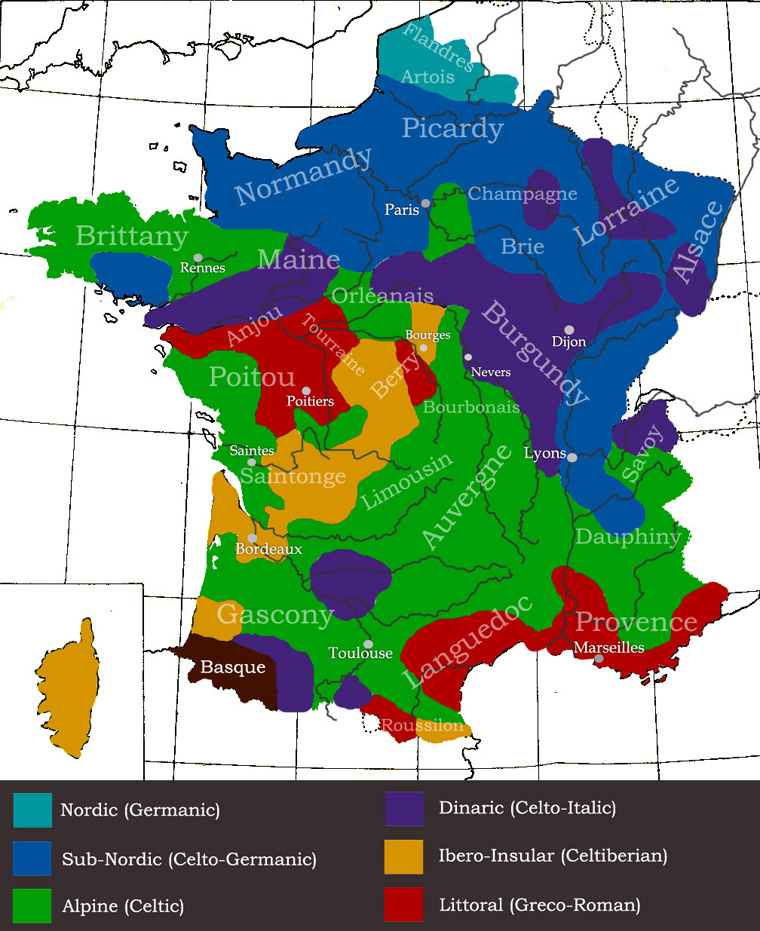France is an ethnically complex country. It is the largest country in Europe. It has been settled or invaded by all the great cultures of Europe : Celts, Basques, Greeks, Romans, Germans, Norses, etc. Furthermore, it is usually accepted that northern France is closer both culturally and ethnically to northern Europe, while the southern part of the country is definitely more southern European in every respect.
But things get even more complicated once we try to divide France by region according to how people look, or what DNA tests tell us. There is no clear divide between all the peoples that have settled in France in history.
The easiest group to spot are the Basques, around the western Pyrenees, who have managed to keep a strong cultural identity of their own.
The Bretons are often considered to be the last "Celts" in France. Although they may be the last to speak a Celtic language, genetically they are far from being outsiders like the Basques. In fact, most of France used to be Celtic 2000 years ago, and Celtic genes can still be found in most of the country.
The most "Celtic" parts of France are the remotest ones, deep into the mountains of the Massif Central, especially in Auvergne and the Cevennes. Brittany is in fact less genuinely Celtic due to the influx of Germanic people from Normandy or Britain.
Notwithstanding a series of invasions by various Germanic tribes (Franks, Burgunds, Visigoths, Danish Vikings...), and territory gained over Germany (Alsace and Lorraine), the only region that is overwhelmingly of Germanic descent is the Nord-Pas-de-Calais, only annexed to France 350 years ago. Normandy, Picardy, Champagne, Lorraine and Alsace have all a lot of Germanic blood, although mixed with indigenous Celtic one.
The Mediterranean coast of France was settled very early by the Greeks, who founded such cities as Nice, Marseilles or Montpellier. This was also the first region of France to come under Roman domination, and to be heavily settled by Roman people. Consequently, most of the people from the Languedoc to the Provence are closer to central Italians and Greeks than to central and northern French people.
But the most surprising of all is to find people who look typically Mediterranean as far north as the Loire Valley, in the traditional provinces of Poitou, Anjou, Tourraine and Berry. This appears to be another region of France heavily settled by the Romans. Tests of the Y-chromosome have shown so far (although at an early stage of research) that a lot of people in this region indeed belonged to haplogroup J2, typical of Greco-Roman people.
Here is a map of the ethnic division of France inspired by Prof. Montandon's work. Names of traditional provinces as well as a few key cities were added for an increased visibility.

But things get even more complicated once we try to divide France by region according to how people look, or what DNA tests tell us. There is no clear divide between all the peoples that have settled in France in history.
The easiest group to spot are the Basques, around the western Pyrenees, who have managed to keep a strong cultural identity of their own.
The Bretons are often considered to be the last "Celts" in France. Although they may be the last to speak a Celtic language, genetically they are far from being outsiders like the Basques. In fact, most of France used to be Celtic 2000 years ago, and Celtic genes can still be found in most of the country.
The most "Celtic" parts of France are the remotest ones, deep into the mountains of the Massif Central, especially in Auvergne and the Cevennes. Brittany is in fact less genuinely Celtic due to the influx of Germanic people from Normandy or Britain.
Notwithstanding a series of invasions by various Germanic tribes (Franks, Burgunds, Visigoths, Danish Vikings...), and territory gained over Germany (Alsace and Lorraine), the only region that is overwhelmingly of Germanic descent is the Nord-Pas-de-Calais, only annexed to France 350 years ago. Normandy, Picardy, Champagne, Lorraine and Alsace have all a lot of Germanic blood, although mixed with indigenous Celtic one.
The Mediterranean coast of France was settled very early by the Greeks, who founded such cities as Nice, Marseilles or Montpellier. This was also the first region of France to come under Roman domination, and to be heavily settled by Roman people. Consequently, most of the people from the Languedoc to the Provence are closer to central Italians and Greeks than to central and northern French people.
But the most surprising of all is to find people who look typically Mediterranean as far north as the Loire Valley, in the traditional provinces of Poitou, Anjou, Tourraine and Berry. This appears to be another region of France heavily settled by the Romans. Tests of the Y-chromosome have shown so far (although at an early stage of research) that a lot of people in this region indeed belonged to haplogroup J2, typical of Greco-Roman people.
Here is a map of the ethnic division of France inspired by Prof. Montandon's work. Names of traditional provinces as well as a few key cities were added for an increased visibility.


